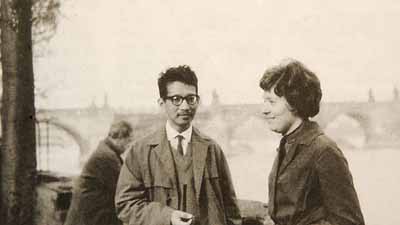‘Tell the World the Truth’
(Page 2 of 3)
Despite Minn Latt’s academic accomplishments in Czechoslovakia, his native land remained close to his heart. Minn Latt closely followed political events in Burma, and kept in touch with his CPB comrades who were operating both on the Sino-Burmese border and in the Pegu Yoma mountains in central Burma where the CPB had established its headquarters. By the late 1960s, the CPB also began to penetrate the Wa Hills in northern Burma.
 |
| Min L att and Dagmar Bečková in Prague. (Photo: Burma Center Prague/Dagmar Bečková) |
Also in 1967, the year before the Prague Spring reformists were crushed by the Warsaw Pact invasion, Minn Latt decided to leave Czechoslovakia for China. He arrived in Beijing and remained there until 1969, studying the Shan language. He then went to Shan State, Burma, where he took up residence on the Sino-Burmese border, rejoined his CPB comrades and studied Wa and Shan. According to former CPB members, his work included transcribing Wa into Latin script.
Minn Latt, however, was a man who understood that speaking truth to power does not only mean confronting those one opposes, but also the powerful within one’s own camp. He courted trouble with the CPB by submitting critical reports to politburo leaders, and although the contents of his reports remain unclear, what is known is that they didn’t please party leaders.
In the late 1970s, Minn Latt was detained by the CPB in the northeastern region of Shan State and kept together with Burmese prisoners of war. The scholar spent his time with 15 Burmese soldiers, including an officer, who were captured in battle.
According to former CPB members, when the soldiers planned an escape in [1985], Minn Latt decided to join them. The CPB learned of the break-out, however, and its troops chased down Minn Latt and the Burmese soldiers, opened fire and killed them all. Former Communists are reluctant to talk about Minn Latt’s final episode, and it is not known whether the CPB headquarters gave a shoot-to-kill order or troops acted on their own.
Despite his tragic demise in a remote jungle, Minn Latt’s inspirational and intellectual influence on Burma and its relationship with the current Czech Republic remain to this day.
“Modernization of Burmese,” along with Minn Latt’s other works, “became a great inspiration and support to modern Burmese scholars, writers and journalists in their fight against traditionally conservative scholars who considered the classical Burmese language the only suitable means of expression for writing serious texts,” said Bečková.
She said the younger generation of Burmese authors began to use modern language not only in literature but in other texts as well, demonstrating that the modern method of expression makes the language clearer and more comprehensible. This has carried over until the present, with more and more articles and studies in Burmese newspapers, magazines and books being written in the modern language.
In addition, due certainly in part to Minn Latt’s trailblazing efforts during his time in Prague in the 1950s and 60s, Havel and the current Czech Republic have become prominent supporters of the Burmese opposition and its struggle for democracy and human rights.
In April, the Czech Republic became the third country to back the recommendation made by the UN human rights special rapporteur on Burma, Tomás Ojea Quintana, that the UN Security Council examine setting up a Commission of Inquiry into war crimes and crimes against humanity in Burma.
« previous 1 | 2 | 3 next page »
|
||
|
||
|
||
|
||
|
||
|
||
